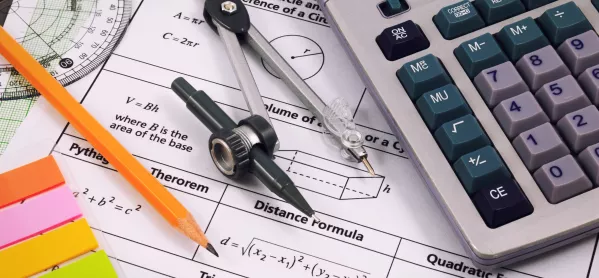GCSEs 2022: Ofqual maths lost learning plan ‘flawed’

Maths teachers have said that providing formulae sheets for students in 2022 GCSE exams will have “no significant mitigating effect against the effects of the pandemic”.
Ofqual and the Department for Education have launched a consultation on proposed changes to GCSEs and A levels in 2022 to adjust exams to allow for students’ learning loss during the Covid crisis.
The proposed changes, announced this week, include the idea that students sitting maths GCSE should be able to access formulae sheets in their exams rather than having to memorise them.
GCSEs 2022: What Ofqual proposals mean for your subject
Exams 2022: ‘Very concerning’ lack of plan B for exams
Exclusive: Parents push teachers to raise GCSE grades
But some maths teachers have raised concerns that this will do little to address students’ learning loss next year.
GCSEs 2022: Allowing formulae sheets in maths exams ‘won’t make much difference’
Hayden Rissbrook, chair of the Association of Teachers of Mathematics, told Tes that formulae sheets were not “particularly controversial” in that they were used in maths GCSE exams until the change to the numerical 9 to 1 grading system.
“I think what is a surprise is the thought that a formulae sheet would have some sort of significant mitigating effect against the effects of the pandemic, because that’s really not the case,” he added.
“Firstly, I think that’s because there’s actually very few formulae to remember in the beginning, and for most students remembering the formulae isn’t the barrier to success - what they’ve really got to be able to do to perform well is apply those formulae in varied contexts and demonstrate their use in standard and novel problems.
“And it’s the opportunities to practise those sort of skills with the guidance and feedback of teachers that’s the main barrier to student progress in the pandemic. Providing them with the formulae that could largely be well remembered by the majority of students is not going to have any kind of mitigating effect on that issue.”
Mr Rissbrook said that Ofqual and the DfE were in an “extremely difficult position” when it came to mitigating learning loss for maths, as removing sections of the syllabus would disadvantage schools depending on the order they had taught topics, while introducing optionality was likely to benefit students who had not had their learning significantly disrupted, as they would have “free choice” over which topics to answer.
Mr Rissbrook said optionality would also impact progression on to A-level studies.
“Don’t get me wrong, students will welcome having the formulae sheet because they will see it as one less thing to remember and another prop to help them in the process,” he added.
“I personally don’t think adjustments to the mathematics exam are the answer. It’s an intractable problem that means facing the usual GCSE exams is likely to be what occurs, for want of a better alternative.
“I think this is a problem we are going to have to teach our way out of.
“That means having clarity, from the very first day in September, as to how the GCSE will look in 2022 and, importantly, what the ‘plan B’ is in the event of further disruption.
“Then allow maths teachers to focus on what they do best: assessing pupils, responsively adjusting the curriculum, delivering high-quality lessons and preparing their students for the challenges ahead. The profession has already shown immense flexibility and resilience to maintain education; I have every faith it will continue to do so.
“This also means freeing teachers and schools from unnecessary burdens and changes, so the sole focus of the profession is restabilising the system and young people’s lives.”
Posting on social media, further education lecturer Gary Mason-Dring compared providing formulae sheets to students with giving someone a printout of road signs to help them pass their driving test.
The provision of a formulae sheet in GCSE Maths to mitigate disruption to teaching and learning is rather like giving a printout of a few road signs to help someone pass their driving test. It highlights an ignorance of the skills affected. I hope there’s more to follow. https://t.co/JQ8JGhB0Oq
- Gary Mason-Dring (@garymasondring) July 13, 2021
However, maths teacher Mark Crossley said he had responded to Ofqual’s consultation by stating: “Access to a formulae sheet will allow students to demonstrate their mathematical understanding without being fully reliant on recall of formulae. This will allow students to focus their preparation time on mastering skills rather than learning formulae.”
An Ofqual spokesperson said: “We are keen to gather views from teachers, parents and students as we go through the consultation process on proposals for summer 2022 and encourage them to feed into it.”
Register with Tes and you can read two free articles every month plus you'll have access to our range of award-winning newsletters.
Keep reading with our special offer!
You’ve reached your limit of free articles this month.
- Unlimited access to all Tes magazine content
- Save your favourite articles and gift them to your colleagues
- Exclusive subscriber-only stories
- Over 200,000 archived articles
- Unlimited access to all Tes magazine content
- Save your favourite articles and gift them to your colleagues
- Exclusive subscriber-only stories
- Over 200,000 archived articles
topics in this article



